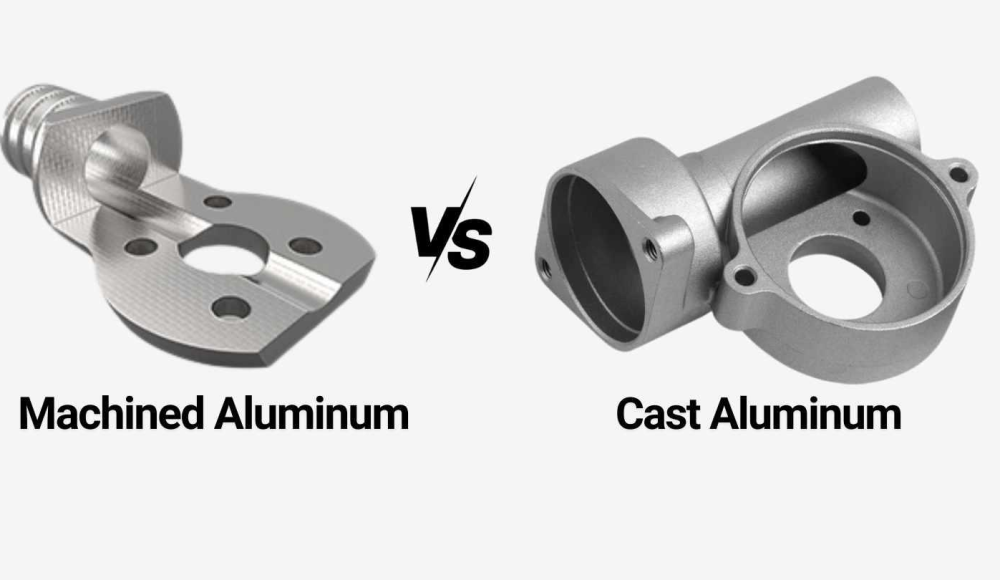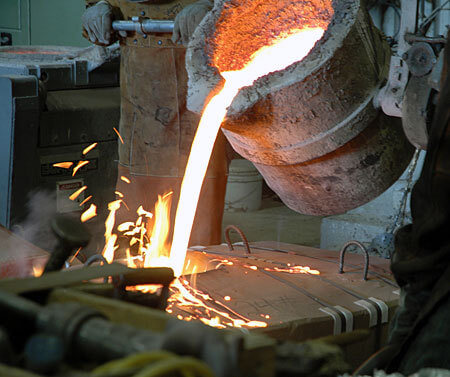The Duty of Aluminum Foundries in Progressing Lightweight Manufacturing Solutions
Aluminum foundries substantially contribute to the advancement of light-weight manufacturing options. Their innovative casting innovations yield high-strength, light-weight parts essential for industries such as automotive and aerospace. This advancement not just improves item performance however also promotes sustainability via making use of recycled materials. As these foundries adjust to emerging techniques and innovations, they lead the way for future growths in producing performance and environmental responsibility. What lies ahead in this transformative trip?
The Benefits of Lightweight Products in Manufacturing
As sectors increasingly seek effectiveness and sustainability, the fostering of light-weight products in manufacturing has emerged as an important strategy - Aluminum Foundry. These materials, especially light weight aluminum and composites, offer many benefits that boost production procedures and product performance. Mostly, their reduced weight contributes to lower power usage during transport and procedure, bring about considerable cost savings
Moreover, lightweight products facilitate the layout of even more complex geometries, permitting better technology in item development. This adaptability commonly causes improved functionality and efficiency, satisfying the evolving demands of contemporary consumers.
Furthermore, the use of light-weight products can enhance the longevity of products as a result of their resistance to deterioration and fatigue. This sturdiness not just reduces maintenance costs however additionally supports sustainability efforts, as longer-lasting items add to much less waste. To summarize, the advantages of lightweight materials are essential in driving performance, innovation, and ecological obligation in production.
Innovations in Light Weight Aluminum Casting Technologies
Current developments in light weight aluminum spreading modern technologies are transforming the production landscape, particularly in the production of light-weight parts. Advancements such as high-pressure die spreading and vacuum pass away spreading have significantly boosted the accuracy and surface finish of aluminum components - Aluminum Casting Company. These methods enable for the development of complex geometries while lessening material waste and boosting mechanical homes

Additionally, the application of real-time surveillance systems assures top quality control throughout the spreading procedure, bring about more constant item end results. Jointly, these developments not just improve the performance of light weight aluminum components yet likewise support the industry's shift towards more sustainable manufacturing methods.
Applications of Light Weight Aluminum Components in Various Industries
While light weight aluminum components have long been used in numerous sectors, their convenience and light-weight buildings continue to drive cutting-edge applications across markets such as vehicle, aerospace, and building and construction. In the vehicle sector, aluminum is significantly used for engine blocks, wheels, and body panels, improving fuel effectiveness and performance. Aerospace producers leverage aluminum for airplane frameworks and components, profiting from its strength-to-weight proportion to improve gas economic climate and payload ability.
In the building field, aluminum is preferred for window frames, roof, and architectural aspects, providing resilience and resistance to deterioration while decreasing general building weight. In addition, the electrical and electronics sectors profit from aluminum's conductivity and lightweight nature, using it in electrical wiring, rooms, and warm sinks. These diverse applications highlight the important duty of aluminum components, which not just satisfy sector needs however additionally add to developments in item style and performance throughout several fields.
Sustainability and Energy Performance in Aluminum Foundries
The light weight aluminum foundry industry plays a crucial duty in promoting sustainability and power efficiency, especially as need for lightweight parts remains to expand across different industries. Foundries are increasingly taking on Recommended Reading ecologically pleasant practices, such as utilizing recycled aluminum, which significantly reduces power consumption and greenhouse gas discharges contrasted to key aluminum manufacturing.
Furthermore, developments in casting modern technologies enhance power performance by maximizing the melting procedures and minimizing waste. Techniques like die spreading and investment casting permit accurate product usage, minimizing excess and scrap.
Furthermore, several shops are purchasing sustainable energy resources to power procedures, even more reducing their carbon footprint. Implementing power management systems makes it possible for factories to enhance and monitor energy usage, guaranteeing they run at peak performance.

Future Trends in Lightweight Manufacturing Solutions
How will arising innovations shape the future of light-weight manufacturing services? Developments such as advanced materials, automation, and additive production are readied to redefine manufacturing procedures. The combination of smart production modern technologies, including the Web Your Domain Name of Points (IoT) and artificial intelligence (AI), will make it possible for real-time surveillance and optimization, boosting effectiveness and decreasing waste.

As sustainability proceeds to be an extremely important problem, light-weight options will progressively focus on recycling and recycling products, aligning with round economic situation concepts. This evolution in light-weight manufacturing will not just boost item performance but likewise add to environmental goals, making certain that the market continues to be affordable in a quickly transforming market landscape.
Frequently Asked Inquiries
How Do Light Weight Aluminum Foundries Make Sure Top Quality Control in Production?
Light weight aluminum foundries assure quality assurance in production via rigorous testing, standardized treatments, and continual tracking - Aluminum Casting Company. They carry out advanced modern technologies and experienced personnel to preserve uniformity, reduce flaws, and satisfy market standards throughout the production procedure
What Are the Main Challenges Dealt With by Aluminum Foundries?
Light weight aluminum shops deal with difficulties such as fluctuating resources prices, maintaining production efficiency, guaranteeing regular top quality, adjusting to technological innovations, and conference environmental policies, all of which influence their total operational performance and competition in the market.
Exactly How Does Aluminum Recycling Effect Foundry Workflow?
Aluminum reusing considerably enhances shop procedures by decreasing raw product prices, decreasing power usage, and decreasing environmental effect. This lasting technique makes it possible for factories to enhance performance while fulfilling boosting need for lightweight, high-performance aluminum products.
What Abilities Are Needed for Employees in Aluminum Foundries?
Employees in try this light weight aluminum factories need skills in metallurgy, machining, quality control, and safety and security techniques. Proficiency in running equipment, comprehending alloy buildings, and analytic are additionally essential for efficient production and preserving high safety criteria.
Exactly How Do Aluminum Foundries Take Care Of Waste Management?
Aluminum factories handle waste with reusing scrap steel, utilizing efficient waste segregation techniques, and sticking to ecological guidelines. They apply lasting practices to minimize garbage dump payments, ensuring that harmful materials are dealt with properly.
Aluminum shops greatly contribute to the development of light-weight manufacturing remedies. Current innovations in aluminum casting technologies are reinventing the manufacturing landscape, specifically in the manufacturing of light-weight elements. While aluminum elements have long been made use of in various industries, their flexibility and lightweight properties proceed to drive innovative applications throughout industries such as vehicle, aerospace, and building. Additionally, the electrical and electronics industries profit from light weight aluminum's conductivity and light-weight nature, using it in circuitry, units, and heat sinks. The light weight aluminum shop industry plays a crucial role in promoting sustainability and power effectiveness, particularly as demand for light-weight components continues to expand across various markets.